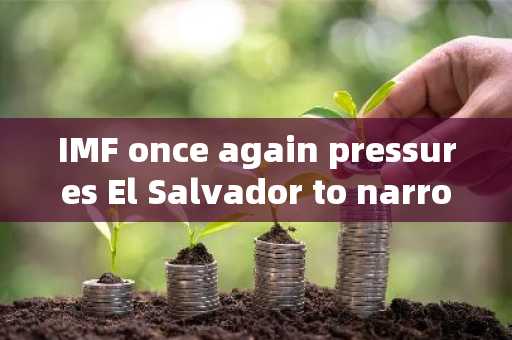IMF once again pressures El Salvador to narrow the scope of application of the Bitcoin Law and stren
IMF puts pressure on El Salvador again
According to Cointelegraph, the International Monetary Fund (IMF) once again called on El Salvador to reduce its Bitcoin policy and comprehensively reform its regulatory framework for digital assets at a press conference on October 3rd.

Julie Kozack, Director of the IMF Communications Department, did not provide specific details on the proposed regulatory reforms, but instead provided the following statement:
Our suggestion is to narrow the scope of application of the Bitcoin Law, strengthen the regulatory framework and supervision of the Bitcoin ecosystem, and limit the risk of public sector holdings of Bitcoin
Since El Salvador legalized Bitcoin as a legal tender in 2021, the IMF has been pressuring the country to abandon Bitcoin and return to the traditional financial system.
In August 2024, the IMF made a similar request for the second time, but also acknowledged that many risks associated with Bitcoin adoption have not yet been fully realized.
IMF's hostile attitude towards Bitcoin and cryptocurrency
The IMF's hostile stance towards Bitcoin is well known. As global fiat currencies continue to depreciate, some individuals and a few countries are gradually moving away from debt based fiat currencies and turning to the prudent monetary principles possessed by Bitcoin.
In 2023, the IMF will provide technical advice to Andorra to assist the country in recording and monitoring Bitcoin transactions. In March 2024, the IMF recommended that Pakistan impose a capital gains tax on cryptocurrencies to qualify for its $3 billion bailout loan.
Recently, IMF executives have proposed taxing the energy consumed by cryptocurrency mining to reduce carbon emissions. Such additional taxes could lead to an 85% increase in energy costs for miners, which could be a heavy blow to an industry that is already facing pressure to halve its economy and increase mining difficulty.
IMF promotes central bank digital currency
On the one hand, the IMF opposes Bitcoin and other non state controlled cryptocurrencies, while on the other hand, it actively promotes the development of central bank digital currencies (CBDCs) globally.
In September of this year, the IMF launched its CBDC development framework "REDI", which stands for "Regulation, Education, Design, and Incentives" and aims to assist central banks in better promoting CBDCs to encourage public adoption.
